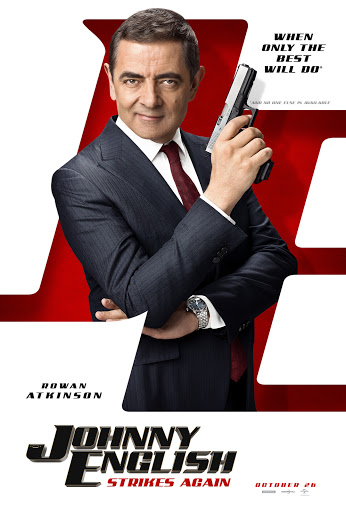 |
| I made a terrible mistake |
I really dreaded watching Johnny English Reborn. The first Johnny English had some laughs but was pretty uninspired as a spy comedy, so I went into the sequel mindful of the rule of diminishing returns. I was shocked that Reborn was as respectable as it was, and while it did not have as many laughs as the original, it was not the disaster I expected.
I cannot say the same for its sequel.
While the second movie benefited from a comparatively big budget and a recognisable cast of talented actors, Strikes Again is a sorry come-down. Small in scale and with a more televisual, square aesthetic, it looks and feels like a bargain bin sequel.
Now, having a smaller budget does not a bad movie make. Pooling resources in service of a bad or non-existent idea does.
This movie is the sequel that Reborn should have been. In that it feels like a photocopy of the original, down to the return of Ben Miller's Bough, a sultry female agent for English to moon over and an arrogant, unlikeable central character.
It is like Reborn did not exist. English is back to being a know-it -all who gets out of trouble either through luck or the actions of his competent sidekicks. Across the three movies, they have never really found a way to make English likeable - he never has a moment of being humbled or experiencing self-reflection and still treats Bough the same way he did in the first movie.
What really grates is how uninspired the whole thing is. What is worse is how promising the first few minutes are: Emma Thompson is introduced as the beleaguered, hard-drinking Prime Minister, who is constantly trying to project strength but is overwhelmed by the crises overcoming the country. A vague riff on Theresa May?
Maybe. Regardless, Thompson is great fun, cutting through everyone else's BS with a delightful bluntness.
We are also introduced to Charles Dance, Michael Gambon and Edward Fox (Day of the Jackal) as fellow ex-agents who have been brought in from the cold along with English. Could we be on the crest of UK's answer to RED?
NOPE. English engages in some buffoonery, takes these gentlemen out of action, and carries on the mission solo with no repercussions.
While Ben Miller's return is welcome, there is a corresponding regression in English's character. It feels like the filmmakers could not find a way to progress the pair's relationship, and decided to stick with the established dynamic. This would be okay if the jokes were good and plentiful, but they just are not there. And what jokes are there just feel like distaff versions of bits from previous entries.








